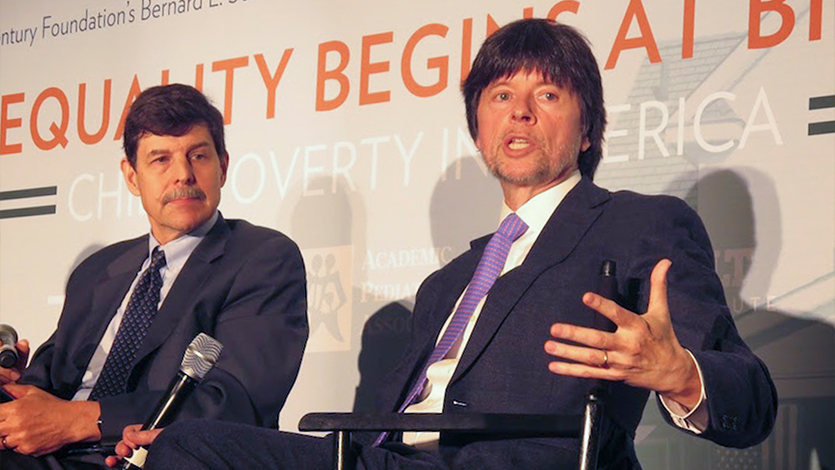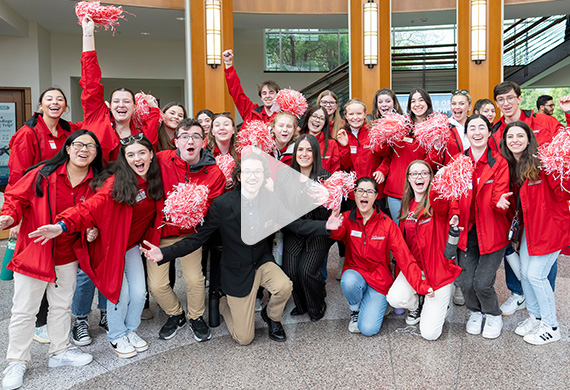Marist Professor Serves as Advisor on new Ken Burns Film

September 20, 2022 – Earlier this week, an important new film entitled The U.S. and the Holocaust began airing on PBS. Produced by Ken Burns, Lynn Novick and Sarah Botstein, this documentary seeks to break new ground by providing a detailed examination of how the American people and their government responded to this unprecedented tragedy.
Serving as an historical advisor on the project was Marist College Professor of History and Senior Fellow of the Roosevelt Institute, Dr. David Woolner. Widely regarded as one of the nation’s preeminent scholars on the presidency of Franklin Roosevelt, we asked Dr. Woolner how he came to be involved in the project and why he thinks this film is important.
Dr. Woolner’s work on The U.S. and the Holocaust, stemmed in part from his serving as an historical advisor to the Ken Burns film The Roosevelts: An Intimate History and in part from his book, The Last 100 Days: FDR at War and at Peace, which includes two chapters that explore FDR’s views on the establishment of a Jewish homeland in Palestine and his subsequent attempt near the end of his life to convince Ibn Saud, the King of Saudi Arabia, to support the idea.
“As was the case with the documentary on the Roosevelts, this involved viewing an early rendition of the film, along with Ken Burns and his staff, passing along our immediate reaction and recommendations, and then reading the script, on our own time, so as to provide a further opportunity for reflections, recommendations and fact-checking,” said Dr. Woolner. “Given that The Roosevelts ran 14 hours, my work on that film involved spending a full working week at Burns’ production facilities in New Hampshire. Thanks to the pandemic, however, the work on The U.S. and the Holocaust was conducted via zoom.”
As Woolner observes, the U.S. reaction to the Holocaust, and the decisions behind the United States’ response on whether to open its doors wider to those desperate to leave Europe in the 1930s has long been the subject of debate.
“This is what makes this film so important,” he says. “Burns, Novick and Botstein offer us a more comprehensive look at how the US failure to allow more Jewish refugees into the country in the years prior to the Holocaust fits within the longer pattern of American history. We like to think of ourselves as a nation that welcomes immigrants, but the reality is that during much of the twentieth century and beyond, we have been consumed by xenophobia, much of it driven by racism and antisemitism. It was this nativist climate that made it so difficult for FDR to ask Congress to overturn the highly restrictive immigration quotas established by the 1924 National Origins Act—with tragic consequences.”
While there is much to criticize and evaluate on the American response to the Holocaust, Dr. Woolner observes that the United States still undertook some significant steps at a time where immigration in the country had been severely scaled down.
“As the film rightly points out, the United States took in more Jewish refugees than any other sovereign nation in the world at the time. We are also the only country to establish a government agency—the War Refugee Board—dedicated to the rescue of the Jews during the Holocaust. But the sad reality is that the United States could have done much more to help the Jewish victims of Nazi persecution, had the American people and their government been more willing to live up to the ideals etched on the Statue of Liberty. Ken Burns has said that this is the most important film he has ever made. I agree. If you have not seen it, I would urge the entire Marist community to view this extraordinary documentary. It raises important questions, not only about America’s past, but also about the fragile nature of democracy, and our present willingness to respond to the all-too-frequent refugee crises that continue to plague humanity.”
The series debuted on September 18 on PBS. Check local listings for times.
Dr. Woolner is the author of The Last 100 Days: FDR at War and at Peace, which served as a baseline for the FDR Presidential Library and Museum’s new Special Exhibit on FDR’s final year in office. He is also editor/co-editor of five books, including FDR’s World: War and FDR the Vatican, and the Roman Catholic Church in America. He is a member of the Scholarly Board of the Gilder Lehrman Institute for American History and was recently named a Fulbright Specialist by the U.S. Department of State’s Bureau of Educational and Cultural Affairs. He has served as historical advisor for numerous special exhibitions at the FDR Presidential Library, and is the editor for the Palgrave Macmillan book series, The World of the Roosevelts.



